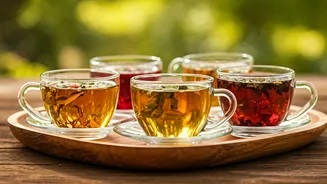Introduction to Herbal Teas
Herbal teas have long been used for their potential health benefits, and many of them have been shown to positively affect cholesterol levels. Unlike traditional
teas made from the Camellia sinensis plant, herbal teas are crafted from various herbs, fruits, flowers, and spices. These infusions offer a range of antioxidants and other beneficial compounds that may contribute to overall health. Incorporating herbal teas into your daily routine is an easy and enjoyable way to support your well-being. Understanding which teas are effective can help you make informed choices about your health and wellness goals, providing a natural approach to manage cholesterol levels.
Green Tea's Impact
Green tea is celebrated for its rich antioxidant content, particularly catechins. Studies suggest that these catechins can help lower LDL (bad) cholesterol levels and improve overall heart health. Regular consumption of green tea has been associated with a reduced risk of cardiovascular diseases. The catechins in green tea work by inhibiting the absorption of cholesterol in the gut and preventing the oxidation of LDL cholesterol, which can damage arteries. Making green tea a regular part of your diet can be a proactive step towards supporting healthy cholesterol levels and cardiovascular function.
Oolong Tea's Benefits
Oolong tea, a partially oxidized tea, also provides benefits for cholesterol management. Similar to green tea, oolong tea contains antioxidants that can reduce LDL cholesterol. Research indicates that drinking oolong tea may increase HDL (good) cholesterol levels. The unique processing of oolong tea gives it a distinct flavor profile, making it a pleasant addition to your daily beverages. Its ability to influence both LDL and HDL cholesterol makes it a valuable option for promoting a healthy lipid profile. Regular consumption can support a balanced cardiovascular system, contributing to overall health.
Hibiscus Tea for Cholesterol
Hibiscus tea, known for its vibrant color and tart taste, has been shown to reduce both LDL cholesterol and triglycerides. The antioxidants in hibiscus help protect against oxidative stress, a major contributor to arterial damage. It can also help lower blood pressure. Studies have demonstrated that consistent intake of hibiscus tea can significantly improve cholesterol levels, providing cardiovascular benefits. Hibiscus tea is easy to prepare and can be enjoyed hot or cold, making it a versatile and healthy choice for daily consumption. This makes it an appealing option for those seeking to support their heart health naturally.
Artichoke Tea's Action
Artichoke tea is an effective option for lowering cholesterol. Artichokes contain cynarin, which helps reduce LDL cholesterol levels and improve liver function. Improved liver function is essential for regulating cholesterol and removing it from the body. Artichoke tea can be a beneficial addition to your diet. The consumption of artichoke tea may aid in the body's natural processes of eliminating cholesterol and protecting against heart disease. Integrating artichoke tea into your routine is a way to support both cardiovascular health and overall metabolic well-being.
Garlic Tea's Advantages
Garlic tea, a less common but potent choice, is known for its ability to lower cholesterol and its other health benefits. Garlic contains allicin, a compound with strong antioxidant and anti-inflammatory properties that can influence cholesterol levels. Garlic can help reduce LDL cholesterol and improve overall cardiovascular health. While the flavor may not be for everyone, the health benefits are notable. Incorporating garlic tea, or garlic in various forms, into your diet provides a natural way to support cholesterol management and heart health, contributing to a holistic wellness approach.






















